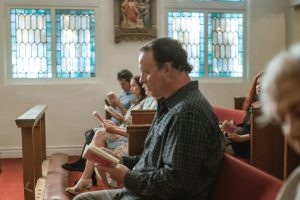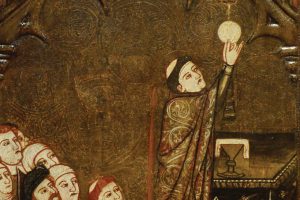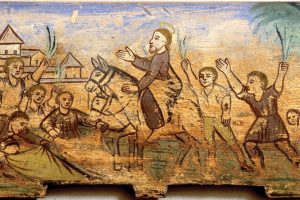 Catholic tradition still has answers for the questions of the contemporary world, says the former Master-General of the Dominican order.
Catholic tradition still has answers for the questions of the contemporary world, says the former Master-General of the Dominican order.
For someone who was almost expelled from school as a teenager for reading Lady Chatterly's Lover during benediction, Dominican Father Timothy Radcliffe certainly qualifies as a bad boy turned good. When asked what turned him around, he might give a simple answer: truth.
"When I left school I met people who told me that my faith was not true," he said recently at Dominican University near Chicago. "This became the big question for me. Is it true? It dawned on me that if it was true, then my faith must be the most important thing in my life."
Contemporary society has lost its taste for seeking truth, Radcliffe argues, which is why he has devoted two books to inviting an increasingly secular world back to church. "We are devouring our small planetary home because we are tempted to see everything in terms of its utility for us," he says. "Consumption is the dominant metaphor of our time."
As a remedy he argues that we must learn to know and love what is around us "not for what it gives us but just because it is. You can delight in a flower without having to pluck and own it."
For Radcliffe, however, the search for truth is not something done alone but in community, what he calls the "pleasure of pursuing the truth in good fellowship."
"We can only have the confidence to engage in such a courageous task if we are sustained by friendship."
Your most recent book is titled Why Go to Church? which followed an earlier one, What Is the Point of Being a Christian? Why are these questions that Christians should be answering now?
For one thing, it's what people are asking. I wrote the earlier book in response to a question from a friend of mine, a professor of sociology. He said to me that his son, who is very bright but not interested in religion, asked what he would get out of being Christian. He said if he became a Buddhist, he'd probably get some inner calm—that's the payback—or if he became a Hindu then maybe he'd get good fortune. But what does Christianity give?
Initially I was shocked by the question; it shows how utilitarian we can be about everything. But I came to see that the question needed to be answered. I think what our faith actually does is open us up beyond immediate paybacks to the God whose worship is our joy, which brings us to ask fundamental questions about who we are and where we're going.
In What Is the Point of Being a Christian? I wished to challenge any little utilitarian approach to being a human, which is that of a consumer: What do I get on the market?
My friend's son actually enjoyed the book, though he didn't know it was written in response to his question. He said: OK, it's not bad. I enjoyed reading all this, but I can do all this by just sitting at home. Why do I have to go to church?
At that moment the Anglican Archbishop of Canterbury, Rowan Williams, contacted me to ask if I would write a book for him for Lent, so Why Go to Church? seemed to be the book I had to write.
It's a question that needs an answer because even when people do believe, they can turn it into a fake spirituality of me and my God, or a beautiful relationship with Jesus, which I can have all by myself. But what you see in the gospels is that Jesus is always drawing people into the company of his friends, disreputable friends sometimes, and that if you want to belong to him, you have to enter that broad, welcoming friendship, which is what we celebrate in the Eucharist.
What do you think has changed in contemporary culture that has people asking questions they never would have a generation or two ago?
I think the big temptation of our culture is trivialization. We have a fascinating, rich culture in many ways, which I love—I'm delighted I live in the beginning of the 21st century—but there is a temptation toward banality, the cult of celebrity. Everybody wants to get out of bed in the morning to read about what Tiger Woods has been up to.
I think earlier cultures, even very recent ones, partly because of the fragility of life and the imminent threat of death, retained a constant awareness of who they were and where they were going—questions about their destiny. Saul Bellow said we in contemporary culture are dying from an ignorance of death. Death is hidden away.
If you run away from death, then you eat and drink and be merry, because you don't know what the hell is going to happen tomorrow and you'd rather not know. I think that's why we now need to be woken up to the profound questions that traditional cultures confronted all the time.
Why go to church? I suppose if we went back 50 years, our ancestors would have belonged to communities and known their neighbors and shared a communal life. They would have known that it's the rituals of the community that sustain people, secular rituals and religious rituals.
We were once deeply communitarian people, and it's only recently that people have been able to become invisible to their neighbors and have lives that are detached from any local community. We need to rediscover why we need to belong.
Does the Catholic tradition have answers to these questions that make sense to contemporary people?
Very often people make a breakthrough when they're faced with death and birth. What I find in England—it's the most secular country in Europe—is people become parents and then realize that their lives don't make sense just in terms of their own span. Now they've got this little bundle of flesh, what Charles Dickens calls an "item of mortality," who will live beyond them and will have other children.
When faced with birth and death, people realize you've got to have a longer story, which is what Christianity offers, from the beginning to the end. I've always loved the Glory Be—" . . . as it was in the beginning, is now, and ever shall be"—it's the big story, and people wake up to that.
I'm a trustee of Cafod, the British version of Catholic Relief Services, and I was talking to the director of international affairs. He talked about realizing his life was astray and that he had to wake up to some ultimate destination, some destiny. I think the church does offer that.
What are the obstacles on the church side to proclaiming the gospel in a way that contemporary people might respond to it?
One obstacle is that we're often too rich. I think the church is always renewed when we really find ourselves with the poor and the powerless. The seductions of power are considerable, perhaps particularly in the United States, where the church is so rich.
In England, they always used to say the difference between the Catholic and Anglican clergy is the Catholic priests went on bicycles and the Anglicans went in cars. If you're on a bicycle, you see people, you stop. You have to be in proximity to the poor, and I think that's a sort of verification of the authenticity of our preaching.
The other thing I'd say is that faced with the mystery of God, we often lack humility. We think we've got it all wrapped up. But any Christian who calls himself or herself traditional knows that faced with the infinite mystery of God, we know so little. Thomas Aquinas said in this world we cannot know who or what God is, and it's the temptation of any ideological group, on the left or right, to think they've got God wrapped up.
I think if we want to be authentic proclaimers of the gospel, we have to be fellow disciples. We have to be beside people as they search and they question and they doubt.
Of course this isn't incompatible with a confidence in preaching, but the best preacher not only boldly proclaims but humbly listens. If you haven't got that humility, then you're just somebody floating an ideology.
One of the elements in our culture is a more aggressive form of unbelief. What do you think is the best response to contemporary atheism?
I mentioned aggressive atheism in a lecture I gave that appeared on YouTube, and I got a 15-page letter saying, "How dare you talk about us aggressive atheists, you little worm?"
First of all you have to understand why they're aggressive. I think part of the reason is that 30 years ago they thought that religion was over, that they'd won the battle. So part of the anger is disappointment. They would never have guessed that if you looked at the news at the beginning of the 21st century, every front page would touch religion virtually every day.
At the same time, a lot of that religion is pretty unpleasant. It's militant, it's fundamentalist, and it's aggressive. If you go from Northern Ireland—where the divisions between Catholic and Protestant are reviving again, I'm afraid—through Iraq, Pakistan, and Afghanistan, what you see is religion that is often involved in violence.
You can understand atheists' anger, and you can't get anywhere in a discussion until you understand and to some extent sympathize with it. It is indeed terrible that religion today is primarily associated with violence and fundamentalism. That has to be a wake-up call for us.
How do you engage those who think that science has done away with the need for religion?
I think in a way the science and religion debate is a non-debate because, if what science says is provable, we believers have to accept it. We cannot believe that reason and faith are incompatible. Cardinal John Henry Newman said that it's not reason that's against us; it's a lack of imagination.
When the famous atheist Richard Dawkins writes about science, he's tremendous—I love to read him. But he runs into problems when he applies metaphors from his scientific knowledge to non-scientific questions, questions that exceed the reach of science about ultimate destiny or the point of being a human being. Science can't answer those questions.
The trouble is not when Dawkins is being a scientist, it's when he's venturing beyond his proper domain. There we have to point out where he's transgressed his proper knowledge.
Many of the best scientists are in fact believers. Science can teach us humility of mind and heart in our endless exploration of the world around us. When new telescopes in the 19th century disclosed for the first time the utter immensity of the universe, the scientist Edwin Hubble talked of the trance-like state of gazing at the galaxies, an experience of vertigo at its unimaginable vastness.
The problem isn't science. The problem is imagination, especially finding an enticing account of our faith that touches the imagination of the young with the great adventure that Christianity is.
The Canadian philosopher Charles Taylor describes Christianity's loss of its own great adventure. For the first 1,500 years of Christianity, Christians of the East and the West agreed that the great adventure of being a Christian was to be taken up into God, that God became human so that we might become divine.
What you begin to get in the Reformation is the loss of that idea. What's offered instead is sort of an eternity of domestic bliss, and that's not very exciting, is it? Martin Luther writes of settling down with Katharina von Bora as the great thing; heaven for him is being happy like that forever.
So instead of being taken up into the very life of God, we have a rather feeble Christianity that says if you're good you go to heaven, where you'll live a nice contented life forever. I think part of the challenge is that we've got to recover some sense of what an utter adventure Christianity is.
What does that adventure look like?
One of the other things that Taylor shows is that beginning with the 16th and 17th centuries, morality is increasingly seen as being about what you're allowed to do. He calls it the birth of the culture of control.
But in the New Testament, in the whole of the Bible, right through Augustine and Aquinas—mainstream Christian tradition—morality is not about what you're allowed to do, it's about who you're called to be. It's about becoming alive. So you have the seven "deadly" sins, and the virtues are about becoming someone in particular.
But with the birth of the secular culture of control, morality becomes more and more about the regulation of behavior. And if God doesn't do it, the state will. I think the present economic and banking crisis has a lot to do with the fact that morality has been reduced to rules, with God as the policeman in the sky.
What we need to do is find a recovery of virtue—that's one form it can take anyway—so that we're invited to become free, joyful, loving, courageous, temperate, prudent people.
In England, the big debate is how far we should regulate the banking system, for example. You can regulate until you're dead, but people will always find a way around it. So the English bishops have produced a wonderful document about the recovery of virtue, and there's a real thirst for that.
I recently have had lectures in London with bankers on this topic, and they respond. They see that this makes sense. So it's an exciting moment in that way.
Catholicism takes some positions that many are finding problematic, for example on homosexuality or the role of women in the church. How can Catholics engage contemporary culture around those issues?
Let's take the first example, homosexuality. It's a very odd word, a very 19th-century word. It didn't exist before the 19th century. It's very odd that you describe somebody primarily in terms of their sexual inclinations.
Imagine that when you meet someone, you said, "Hello, how are you? Tell me about yourself," and they said, "I'm primarily sexually attracted toward people of the other sex." You'd think it a very odd foundation for identity.
I think the important thing about homosexuality is that you have human beings who are capable of love. Cardinal Basil Hume, the great archbishop of Westminster who died in 1999, said the first thing you recognize is the presence of God in that love.
The second thing you recognize is that the challenge that somebody who is gay faces is exactly the same challenge everybody else faces: How do you love well? So you treasure the love that's there and then, with prayer and gospel, seek to know how to love well.
But to reduce the situation to a desire to engage in particular sexual acts is very odd really. The question of what gay people are or aren't allowed to do sexually should be rather a long way down on the list of questions to consider.
The previous cardinal of Westminster, Cardinal Cormac Murphy-O'Connor, who retired a couple of years ago, established a Mass for gay people in central London, and he very carefully went through it all with then-Cardinal Ratzinger. There's a roster of about 15 priests who preside there; I go there a couple of times a year, and the church is full of gay people and their families.
We're having a lot of conversions to Catholicism in the gay community, believe it or not, because what they see is that we value them and recognize the gifts they bring.
And the role of women?
I think that's connected to a wider question, that of the baptized. In John Henry Newman's church in Rome, an inscription reads: John Henry Cardinal Newman, professor of Oxford and so on, but the last line, in Latin, says, "before all things a Christian."
I think part of the trouble is that so many tensions have grown up around ordination, we've actually forgotten that by far the most important dignity that any Christian has is that they're baptized. When somebody asked Pope John Paul II what was the greatest day of his life, he said that he couldn't remember it, but it was the day he was baptized. I think the women's ordination question has become more acute now because the church has become more clerical than in my childhood.
People always think the pre-Vatican II church was a clerical church, and that Vatican II began to break that up. But I grew up as a Catholic in the 1950s and the '60s with a profound sense that the real dignity of every Christian was that they were baptized. I think in recent years people have become more conscious of power and decision-making and less of the beauty of baptism.
There are still some big questions, about women's ordination, for example. I think the primary difficulty isn't ordination as such; it's that ordination is linked to decision-making in the church. If it was just sacramental, presiding at Eucharist, I don't think there would be so much pain, whereas people are acutely aware that in justice, women should have a voice in making decisions. They had more in the past, in the early church, and indeed in the medieval church, when the great abbesses had considerable authority.
Can we see a way back to the recovery of that earlier authority? Pope Benedict has spoken about this often, and he believes that this has to be a priority. We have taken some steps, but they're small ones.
Where do you see these steps?
The biggest change is that already in theology the voice of women is becoming stronger. When I joined the Catholic Theological Association in Britain 20 or 30 years ago, all the members were men and they were all religious—in fact they were all Jesuits or Dominicans, barring one or two. When I went back a couple of years ago, 70 percent of the people in the room were lay, and half were women, so there's a massive transformation already happening.
I was in Indonesia this time last year, where I gave a retreat for about 300 priests and bishops. It was all organized by a young lay woman who told those gathered that she wasn't awfully impressed by their degree of holiness and so had organized a retreat for them! She said she wanted to check up in six months' time to see whether they were any holier.
There was a sort of relaxed relationship between laity and clergy, which you often find in Asia, for example, which means the question of ordination doesn't weigh so heavily because there is this profound sense that we're all brothers and sisters in Jesus Christ.
Another, more difficult example has to do with the sexual abuse of children by Catholic clergy. The church's response to this tragedy must be through laypeople.
The crisis in England wasn't as serious as in other countries because the moment it began to blow up, Cardinal Murphy-O'Connor appointed a senior lay Catholic judge to oversee what procedures must be in place. There is a layperson responsible for verifying compliance so that the clergy and the bishops are answerable to the laity explicitly.
That's helped a great deal, because the temptation is to take refuge in a sort of clerical fog where we protect ourselves. I think what happened in England is a very good model of how to get beyond it.
What would you say to somebody who's not going to church because of some of these issues?
I would share their sadness, but to say I don't want to receive Christ's body and blood—this amazing gift, God become human, Christ saying, "I give myself to you"—how could anybody say that?
Second I'd say that priests are ordained not to represent the local community but the universal church. We aren't members of the American Catholic Church or the English Catholic Church, we're members of the universal Catholic Church, and there's no doubt at this particular moment, the ordination of women would be profoundly divisive because the vast majority of people outside the West wouldn't like it at all.
Given that a lot of non-churchgoers will be in church on Christmas, what would you be preaching with them in mind?
What I would hope people would realize is that if you look at the accounts of Jesus' birth, God is there but nobody notices. There are a few shepherds who didn't really count, a few angels, but basically God was present and nobody noticed. Every Christian and every non-Christian, every person who just turns up, we're all invited to make the surprising discovery that God is already there.
You're not saying to them: "OK, repent of your filthy sins and come back," because God is already in their lives. What we do is we try to help people see that God is already present, otherwise they wouldn't exist.
The other thing I hope is that they would be touched by a little bit of the joy of newness. God is the "Ancient of Days," but God is also every year the newborn child, the new beginning, so you don't want them to go away loaded down with guilt of how terrible they've been. You want them to go away with the joy that they're beginning again, that there's always a new beginning.
This article appeared in the December 2010 issue of U.S. Catholic (Vol. 75, No.12, pages 18-22).













Add comment